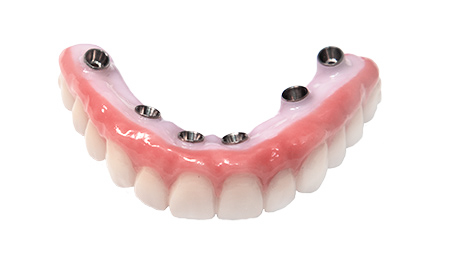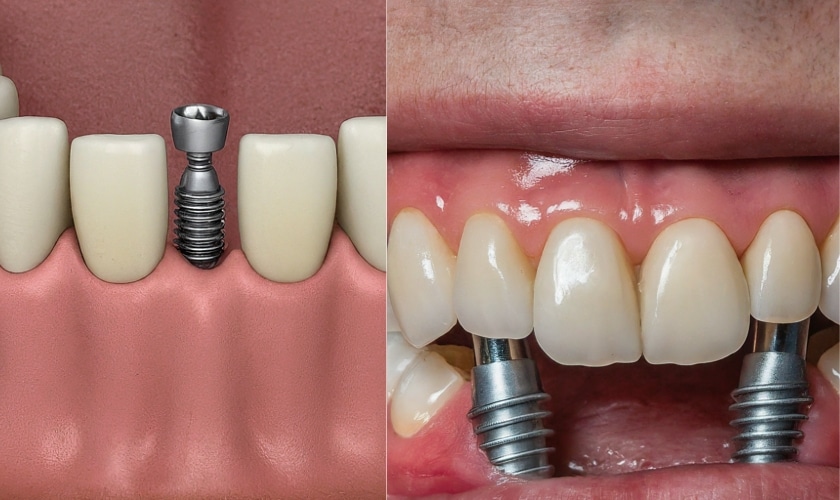Dental Sense Things To Know Before You Get This
Table of ContentsHow Dental Sense can Save You Time, Stress, and Money.Dental Sense Fundamentals ExplainedThings about Dental SenseAn Unbiased View of Dental Sense
are clinical tools surgically implanted into the jaw to recover a person's capability to chew or their appearance. They give support for man-made (fake) teeth, such as crowns, bridges, or dentures. When a tooth is shed due to injury or illness, a person can experience issues such as rapid bone loss, defective speech, or adjustments to eating patterns that lead to discomfort.Dental implant systems contain an oral implant body and oral implant abutment and may also include an abutment fixation screw. Professional teeth whitening. The oral implant body is operatively inserted in the jawbone instead of the tooth's root. The oral implant abutment is normally connected to the dental implant body by the abutment addiction screw and extends via gums right into the mouth to support the affixed fabricated teeth
(https://allmyfaves.com/dentalsense1?tab=Dental%20Sense)Framework of The Oral Implant System selecting oral implants, speak to your oral service provider about the possible advantages and risks, and whether you are a prospect for the procedure. Things to consider: Your general health and wellness is an important factor in identifying whether you are an excellent prospect for dental implants, how much time it will take to recover, and the length of time the dental implant may stay in place.
Cigarette smoking might impact the recovery procedure and lower the long-lasting success of the dental implant. The recovery procedure for the implant body may take a number of months or longer, throughout which time you commonly have a momentary joint instead of the tooth. the dental implant treatment: Meticulously adhere to the oral health instructions provided to you by your oral service provider.
The 30-Second Trick For Dental Sense
Implant failure can cause the requirement for an additional operation to fix or change the dental implant system. Brings back the ability to chew Brings back cosmetic appearance Assists maintain the jawbone from shrinking due to bone loss Maintains the health and wellness of the bordering bone and gums Assists keep adjacent (close-by) teeth secure Improves quality of life Damages to surrounding all-natural teeth throughout dental implant placement Injury to the surrounding tissues during surgery, such as sinus perforation Injury during surgical treatment (for instance, fracture of bordering jawbone) Poor function, such as seeming like the teeth do not attack with each other usually A sensation that the tooth hangs or turning in position resulting from an abutment screw loosening up Implant body failing (looseness of the implant body) due to systemic infection, which might be more most likely in people with uncontrolled diabetics issues due to local infection in bone and gums supporting the implant body as a result of postponed recovery, which may be extra most likely in individuals that smoke Problem cleansing the gum tissues around the implant, resulting in poor oral hygiene Unattended periodontal disease Post-surgical numbness due to nerve impingement or damage Constantly notify wellness care suppliers and imaging specialists that you have dental implants before any type of magnetic resonance imaging (MRI) or x-ray procedures.
FDA is not familiar with any kind of damaging events reported for MRI or x-ray procedures with oral implants. Oral implants systems are normally constructed from products that follow global agreement requirements of the International Company for Standardization (ISO) or ASTM International. These criteria have details of what makes a risk-free material.

A dental implant is a framework that changes a missing tooth. With screw-like gadgets, the specialist inserts a dental implant right into the jawbone, and it acts as an anchor for a synthetic tooth, called a crown.
Some Known Incorrect Statements About Dental Sense
Some individuals are not eligible for oral implant surgical procedure. It is for dental surgeons to operate on people with: acute illnessuncontrollable metabolic diseasebone or soft tissue condition or infectionIf these issues are solved, a person can have the surgical procedure. In, oral cosmetic surgeons avoid running on people with: If people with any of the above undergo oral implant surgery, there navigate here is a higher threat of the dental implant falling short.

Dental dental implant surgical procedure is a tailored procedure. It's not the very same for everybody. However the complying with offers a general overview of what you can anticipate your dental practitioner, dental surgeon, periodontist or prosthodontist to do: Position the dental implant surgically. Provide you time to recover. Connect the article and final crown, bridge or denture.
Next, your specialist will meticulously position the oral implant right into your jaw. If your dental implant is near the front of your mouth, your dental practitioner will make a temporary tooth for you to use till you heal.
The 4-Minute Rule for Dental Sense
During the recovery phase, your jawbone must fuse to the dental implant. This procedure can take anywhere from 3 to nine months.
When your dental implant heals, your dental professional can affix the abutment (little connector post) and your final remediation (crown, bridge or denture). This typically takes concerning one hour to finish and may require a 2nd minor surgery. You shouldn't feel any type of pain throughout your oral implant procedure due to the fact that your company will utilize medication to numb your periodontals.